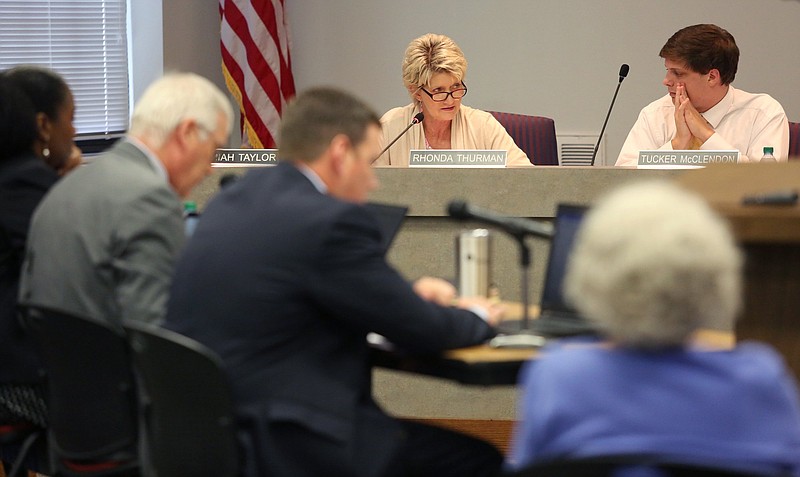MEETING INFORMATION
The Hamilton County Board of Education will meet in a special-called session at 5:30 p.m. on Thursday, July 25, in the board room at 3074 Hickory Valley Road.The board is slated to discuss the budget, school fees, the new ‘Code of Acceptable Behavior and Discipline’ and the superintendent contract.
Hamilton County Schools leaders and school board members are grappling with a $1.39 billion bombshell released Tuesday in the form of a preliminary facilities report, but board members have another looming decision this week.
They are expected to vote on a fiscal year 2020 budget Thursday - again.
The district's original proposed budget was sent back to the board after the Hamilton County Commission voted against a 34-cent property tax rate increase to give the district additional operating funds last month.
The board has been back at the drawing board, alongside the teachers' union and district officials in recent weeks.
Here are five things you should know about the current budget proposal:
1. The revised budget is still $19 million higher than FY 2019's general operating budget.
The district's revised proposed budget comes to more than $411 million, though Chief Business Officer Brent Goldberg has characterized it as basically a mirror image of fiscal year 2019's $390 million budget.
The additional $19 million comes from natural growth in local tax revenue of about $9 million, as well as $10 million in projected revenue. Goldberg has told the Times Free Press that the budget has been more conservative about projected revenue in the past.
The district cites almost $8.8 million in contractual obligations, step increases and other "unavoidable" costs, though, which leaves only about $11 million to use toward new programs or positions.
2. The budget includes funding school leaders hope will alleviate some of the burden of school fees on families.
In May, the school board adopted new - tentative - school fee policies. The new policy would not allow schools to collect general instruction school fees, but instead would let schools ask for a standard $25 arts, science and technology fee and standard parking and graduating senior fees.
Alleviating school fees, which has been a priority for board members including Joe Smith, of District 3, would be made possible through use of $1 million from the district's $36 million fund balance and about $800,000 in the FY 2020 budget.
Those funds then would be allocated to schools based on enrollment to ensure that schools don't lose out on the funding that many rely on.
3. Teachers aren't getting a raise ... sorta.
The Hamilton County Education Association and other teacher representatives announced Wednesday that they had come to a compromise in the growing debate over whether teachers would receive a raise in this year's budget.
The original 5% bump was whittled down to 2.5% in the district's revised budget, but school board member Tucker McClendon, of District 8, introduced a plan that would give teachers a one-time $1,500 bonus and use the funding that would have paid for a raise to fund some of the support personnel included in the original budget.
The district's collaborative conferencing team endorsed the proposal Wednesday, which McClendon said means it will be added as an amendment to the current proposed budget at Thursday's meeting.
4. The budget only allocates $3 million toward maintenance and capital needs.
Historically, or at least for the past decade, the school district has allocated only about $3 million for what Johnson called "ballooning" deferred maintenance needs.
A preliminary report unveiled by an outside consulting group earlier this week found $1.36 billion in capital needs after evaluating 74 school buildings.
At the end of the 2018-19 school year, the board did approve using $15 million of its fund balance to "fix priorities," Board Chairman Joe Wingate of District 7 previously told the Times Free Press.
5. District leaders are worried about the impact on technology.
Though the district will still implement its one-to-one technology initiative in all middle and high schools, giving every student access to a laptop or tablet, leaders are worried about upkeep and support for those devices. The budget only adds four information technology employees, which Johnson says is not enough.
Johnson told Commissioner Greg Martin, of District 3, at a joint meeting of the school board and commission Tuesday that the original budget included resources to help support the rollout and decrease the "widening gap" of technology access across the district.
Contact Meghan Mangrum at mmangrum@timesfreepress.com or 423-757-6592. Follow her on Twitter @memangrum.
